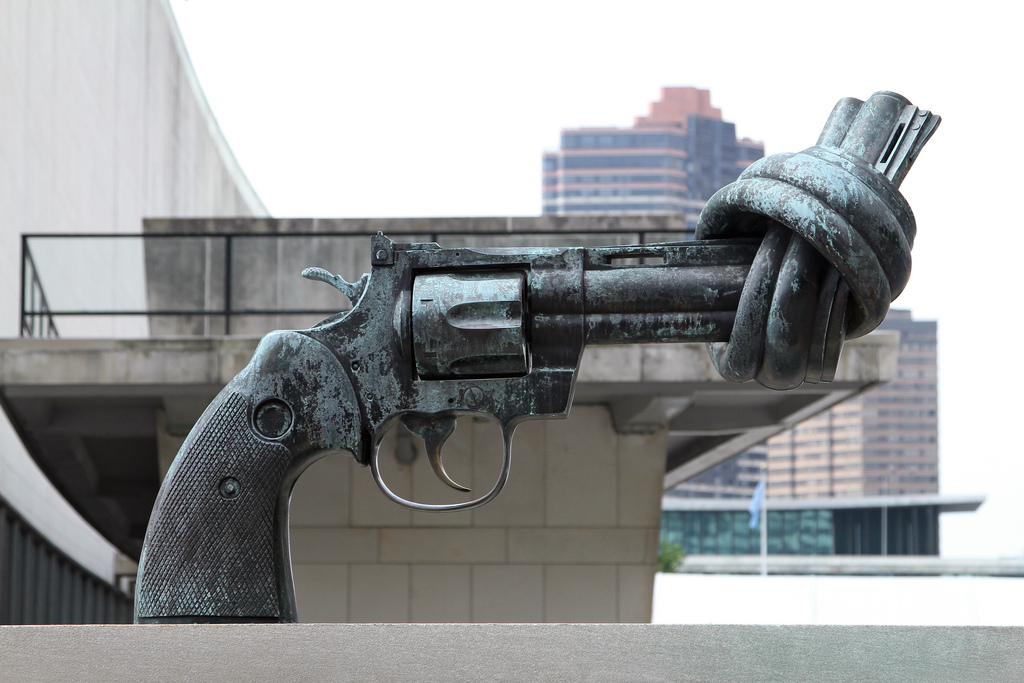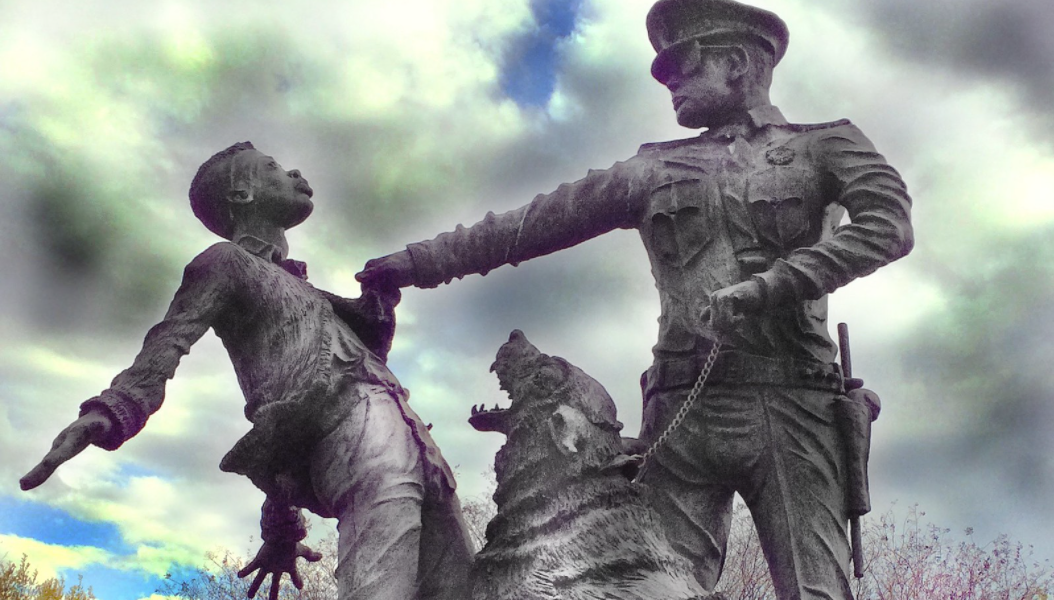When those of us interested in politics look to history for support, we must be wary of reductionism. Though it may be advantageous for headlines to make eye-catching claims, history is much more nuanced.
In “American Theocracy and the War on Christmas,” Alex Jarecki reduces the complex relationship of religion and politics in America to a handful of ahistorical generalizations. In doing so, he produces a misguided assessment of American Christianity that is a disservice to the relationship between Christians and those in the secular public square.
Jarecki’s article begins with the 2015 controversy about a “secular” Starbucks cup that supposedly led Christians to believe “that the company was erasing Christmas.” After introducing a few details about the controversy, he argues that we should celebrate that “our Constitution calls for a separation between church and state,” later implying that this “separation” should limit Christianity’s operative function in public discourse.
To evidence his claims, Jarecki ironically cites a 2018 Time article by US Senator James Lankford and Christian ethicist Dr. Russell Moore that explicitly rejects the belief that the First Amendment should operate “as a tool for silencing oppos[ing] views.”
Nevertheless, Jarecki lists numerous grievances against American Christianity under the guise that some of its activities undermine the theory of “separation” between church and state he advances. For instance, Jarecki condemns the Pledge of Allegiance, US coinage, and the congressional oaths of office because they include references to God.
As explained by the US District Court for the Eastern District of Virginia, First Circuit Court of Appeals, and Ninth Circuit Court of Appeals, however, neither the pledge, nor US coinage, nor the oaths actually violate the First Amendment.
Next, Jarecki claims that “America is a great place to be religious—as long as you’re a Christian,” citing two examples of religious discrimination: recent anti-Muslim assaults and the infamous 2017 Charlottesville “Unite the Right” neo-Nazi rally. Despite these instances of religious discrimination, Jarecki fails to acknowledge that Catholics have been similarly persecuted in the United States. Indeed, White supremacy motivated fervent anti-Catholicism through the height of Catholic immigration to the US during the nineteenth and twentieth centuries. Even today, anti-Catholicism in the US persists: from May to December 2020 alone, over forty Catholic Churches were torched or vandalized.
Not only does Jarecki’s argument ignore that Catholics are Christians and that Christian persecution persists in the twenty-first century, it also erases the prejudice directed at one faith community under the auspices that others face greater discrimination.
The world is a “terrifying place” for believers of every faith.
In addition to this erasure, Jarecki also unfairly attributes the views of certain Christians to all American Christians. For example, he asserts that “American Christians like to claim that they are oppressed for their religious beliefs, even when they are using those religious beliefs as an excuse to oppress others.”
This argument ignores that the Christian community is all but a united front. There is little theological and sociological unity among followers of Christ in the US, and using the actions of some Christians to hypothesize about the ethical convictions of an entire faith community is inaccurate.
Such plurality is also evident in the great ethnic diversity of American Christians, contrary to Jarecki’s assertion that “White Christian conservatives feel as though they are under attack from increasing ethnic and racial diversity.” In actuality, 79 percent of Black Americans and 77 percent of Latino Americans identify as Christian, compared to 70 percent of White Americans. The inclusion of Black and Latino Americans in American Christianity is not a novel, unwanted development, but rather a historical precedent that serves as a foundation for strong faith-based communities. Though there are certainly racial and ethnic biases among some American Christians, those biases do not fall neatly along religious lines, nor are they applicable only to “White Christian conservatives.”
After Jarecki accuses American Christians of using their faith to oppress others, he briefly mentions Our Lady of Guadalupe School v. Morrissey-Berru, alleging that the case “broadened the definition of ‘ministerial exception,’ which prevents employees of religious institutions from suing their employers over discrimination due to the religious nature of their job.”
In reality, Our Lady of Guadalupe School doesn’t expand the ministerial exception. Instead, it affirms long-standing precedent that teachers who teach religion in the classroom and worship and pray with their students are “ministers” of the faith, even if unordained. Contrary to Jarecki’s implicit argument, the Constitution fails to grant courts unfettered power to determine how faith communities hire and fire their “ministers.” Ironically, such a power would involve the overlapping church and state authorities that Jarecki condemned.
Jarecki then argues that American Christians incorrectly cited Justice Amy Coney Barrett’s nomination process as evidence of anti-Catholic bias. He asserts that the criticisms were instead “a legitimate argument about how her rulings are likely to harm vulnerable populations.”
This excuse of rife anti-Catholic reactions to Justice Barrett’s nomination is inadequate and inaccurate considering that Barrett faced religiously prejudiced remarks during her first confirmation. Dianne Feinstein, the Senate Judiciary Committee’s leading Democrat, even remarked to Barrett that “the dogma lives loudly within you.”
The very fact that Barett’s most recent Supreme Court nomination hearings did not feature any similar accusations is not the work of mere serendipity; rather, this omission was a product of intentional calculus on the part of Feinstein and other Democrats who realized that anti-Catholicism might not be an attractive pre-election position.
To provide a lifeline for his ahistorical claims about the Barrett predicament, Jarecki cites statistics about how Christians, particularly Catholics, are “overrepresented” on the Supreme Court and in Congress, ultimately arguing that “there is no anti-Christian or anti-Catholic bias in politics; in fact, it could be argued that there is pro-Christian bias instead.”
Again, the Christian community is not a united front. In 2018, for example, a study in The Journal of the Scientific Study of Religion found that members of the US Senate are primarily driven by their personal political and religious convictions, not established religious traditions. Consequently, even Christian lawmakers of the same denomination do not always vote in the same way.
Unfortunately for Christians and non-Christians alike, representation in governance does not equate to demographic favoritism or the magic erasure of prejudice.
While Jarecki notes that President-elect Joe Biden and House Speaker Nancy Pelosi are Catholic, their status does not disprove the existence of anti-Catholicism. Consider the ridicule that came after some in the media erroneously claimed that President Barack Obama’s victory demonstrated racism’s disappearance. Similarly, it would be absurd to propose that American antisemitism doesn’t exist because Jewish congregants are overrepresented in Congress.
Ultimately, Jarecki’s distorted discussion of Catholics in the public square seems to lend credence to the notion that anti-Catholic bias is encouraged when the faithful hold positions of authority.
He then claims that Christians employ Christianity to advance their political agendas while condemning members of the Muslim and Jewish faiths for expressing their religiously informed beliefs. There are a few ironies in these claims that are worth mentioning.
First, Jarecki’s implicit argument about the inappropriateness of bringing religiously informed beliefs to the public square is not only ill-informed by American history, but also at odds with the claims made in the Lankford and Moore article he cites. In fact, their article correctly acknowledges that during the Constitution’s framing, Thomas Jefferson did not suggest that we should exclude religious people or motivations from public debate. Lankford and Moore actually argue that the free expression of religious beliefs in public debate is one of the greatest advantages of a constitutional system in which there is no established faith.
Secondly, Jarecki’s contention that Representative Ilhan Omar, a Muslim, has been wrongly attacked by “conservative Christians” for her religious convictions is ill-founded, not least because Jarecki only addresses statements from President Donald Trump . . . as if he speaks for all American Christians or that all Christians subscribe to his brand of conservatism.
Ironically, Omar has personally championed her own faith-based discrimination, even accusing Jewish Americans of having a “dual loyalty” to the US and Israel. Furthermore, stopantisemitism.org voted her 2019’s “Antisemite of The Year,” an honor that came with a nearly two-minute video recalling her antisemitic tropes.
In this vein, Jarecki’s implicit claim that “conservative Christians” are the hallmarks of religious intolerance is not only false, but also overlooks that non-Christians can act prejudicially, as in Omar’s case.
Before Jarecki attempts to tie together this list of grievances with the original premise of his article (Christmas and the Starbucks cup), he goes as far as to expand the scope of his earlier claim about bias: “The idea that there is any kind of anti-Christian bias in our government is hypocrisy at its finest.”
This claim disregards the contemporary religious bias that impacts Christians and non-Christians alike. For example, in Roman Catholic Diocese of Brooklyn v. Cuomo, the Supreme Court found that the Diocese was likely to succeed on the merits of its argument that Governor Cuomo (a Catholic) did not display neutrality to religious organizations. In his concurring opinion, Justice Neil Gorsuch concluded: “In [Cuomo’s] judgment laundry and liquor, travel and tools, are all ‘essential’ while traditional religious exercises are not. That is exactly the kind of discrimination the First Amendment forbids.”
Ultimately, the “outrage towards secularism” that Jarecki argues “Christian conservatives” applied to the Starbucks holiday cup controversy cannot historically or presently be explained by the “increasing ethnic and racial diversity” from which they supposedly feel threatened. Not only does this claim implicate numerous false presuppositions, but it also ignores the historical and present diversity of Christian experience. More importantly, it overlooks that religious individuals can act prejudicially without representing an entire faith, as in the cases of Trump and Omar.
Jarecki is largely correct in concluding that “diversity is strength.” However, by disregarding history and present reality, he fails to follow his own prescription for an inclusive national community: “acknowledging the experiences of those different from you.”



